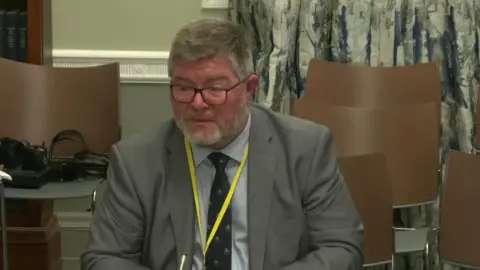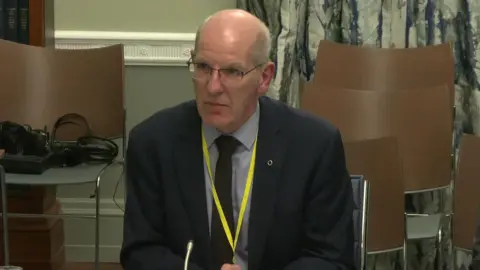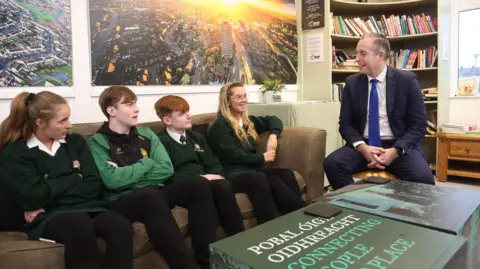Ulster-Scots community needs to be 'convinced' on Commissioner
 BBC
BBCThe CEO of the Ulster-Scots Agency has said there are some in the community "who are waiting to be convinced" about the benefits of having an Ulster British Commissioner.
New language laws came into effect in December 2022 with the passing of the Identity and Language (Northern Ireland) Act.
It included the establishment of the Office of Identity and Cultural Expression, an Irish Language commissioner and a commissioner for the Ulster-Scots and Ulster British Tradition.
Ian Crozier said "everybody lives in hope that these things will deliver tangible improvements."
'Pig in a poke'
Giving evidence to the Executive Office committee on Wednesday, Mr Crozier was asked by the Traditional Unionist Voice MLA, Timothy Gaston if the commissioner role was "just there for the optics".
"I can't really speak to the motivation, Ulster-Scots tends to try to be straight to the point, paper doesn't refuse ink, you can write anything you want down in a political agreement, you can write anything you want down in the face of a bill in parliament there's every possibility it'll turn out to be a 'pig in a poke', " Crozier replied.
"We've had a human rights protection under the European charter for regional minority languages for 25 years. Has it made a demonstrable difference to Ulster-Scots and the lives of Ulster-Scots people? No. Is there a long pile of deliveries that have appeared because we have it? No.
"The fear in this...I think there are a lot of people out in the community who are waiting to be convinced about the benefit that will come from this. Everybody lives in hope. On the face of it the potential is there," he added.
Threadbare?
Mr Crozier was asked if he felt "short-changed" when he compared the role of the Ulster-Scots and Ulster British Tradition commissioner to that of the Irish Language Commissioner.
"I don't want to take anything away from what the Irish language folks have achieved, people lobby, people make the case, people achieve things. We are not looking to take away from that.
"I do personally have a fear that if what people see is lots of deliverables, lots of progress for the Irish language community and then end up looking at a position where the deliverables for the Ulster-Scots community is threadbare, then that is just not going to help the optics overall."
He said he wanted "balanced delivery" across the cultural communities.

Foras na Gaelige, a body responsible for the promotion of the Irish language throughout the island of Ireland, were also giving evidence to the committee on Wednesday.
Chair of the Executive Office Committee, Paula Bradshaw said "it was a momentous day" for the committee as it was the first time evidence has been given in Irish.
During the evidence session, Mr Séan Ó Coinn, CEO of Foras Na Gaeilge was questioned about the "politicising" or "weaponising" of the Irish language.
Mr Ó Coinn said he understood that "there is a history here and a baggage linked to the Irish language" but "people have rights recognised by the UN, UNESCO, by the European council and we should not be restricting those or denying those rights because they don't maybe sit well with other members of the community."
"We now have an opportunity to see Irish as something that belongs to us all, to all our communities so I wouldn't be of the opinion that we should mix it up with issues regarding identity, British identity, Republican identity, nationalist identity, Irish identity even.
"I think it is a heritage issue and something that belongs to anybody who is on this piece of land in which we live and we should look and deal with it in that way," he added.
 Pacemaker
PacemakerMeanwhile, earlier on Wednesday, the Education Minister sat down with Irish speaking young people at a youth centre in Ballymurphy in west Belfast.
“I've said before, we shouldn’t be fearful of people’s identity and languages, whether you converse in English, Irish medium, Ulster Scots and we have many other languages now in Northern Ireland," Paul Givan told BBC News NI.
“My Northern Ireland is big enough to accommodate everybody,” he added.
"We want to build a Northern Ireland which shows respect and equality of treatment for everyone."
